A film has no gender; it’s either good or bad. Hence, its creator should not be judged by their gender either. Honestly, this list should have been called “All Time Great International Filmmakers” because gender cannot confine or define talent. The women on this list have cleared the clutter, they are trailblazers, and have shattered every possible pigeonhole created for them. These ladies refused to conform to the structure and claimed their much deserving emancipation. So, I genuinely think there should not be a separate list for “female” directors, but since most of us are not really conversant with their genius, such lists become imperative.
Good things take time. And when you are searching for the truth, you dawdle. I am also patiently waiting for that perfect world when we don’t need these gender-specific indexes. Till then, read on.
The list comprises of these great female filmmakers from all over the world, in various languages, who are uniquely as away from each other as they could be. But, the one thread knitting them together on this list is their journey. The grapple, the repudiations, the triumph against compartmentalization, these women have more in common than meets the eye. I’ve included directors based on, of course, their work but also, the legacy they leave behind, the number of ceilings they have shattered, how spearheaded and long their journeys have been and most significantly, how consistent they have been all through. You might or might not agree with the list, but you’ve to bow down to the supremacy of these women. That’s not an option!
You might also not find great contemporary female filmmakers like Greta Gerwig or Marielle Heller or Jennifer Kent or Alice Winocour and many such. Because it’s only in the last few years that women have been truly trusted enough to helm a film, and we witness the army of supremely talented women, creating groundbreaking cinema. So frankly, let’s give them some more time before calling them All-Time Greats. Also, the concentration is more on feature film filmmakers, and not documentaries or theatre or short films or television directors.
So here’s the list of 20 all time great female filmmakers:
20. KELLY REICHARDT (USA) (b.1964)
According to critics, Kelly Reichardt has never made a bad film. All her feature films are highly acclaimed and raved at international film festivals. She is the force of American independent cinema, with quiet, minimalistic storytelling. Kelly is kind of the last purist of the indie film world.
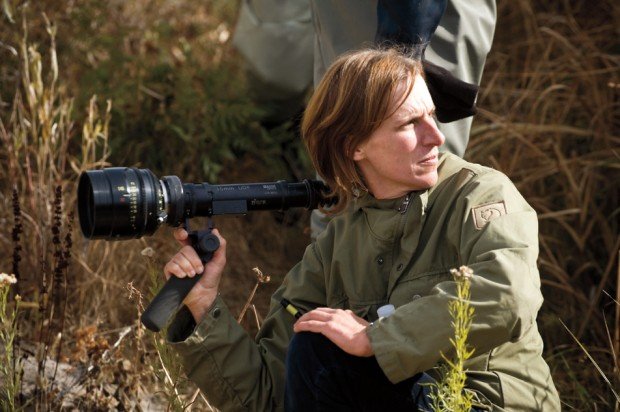
Her spectacularly slow-paced films can take some adjusting to. Her films submerge in the minutiae and the mechanism of daily existence. This approach can really be perplexing for the benighted because watching Kelly Reichardt films, practically means watching nothing happen. She says, her movies are “about the moments of getting from here to there, from the parking lot to the gas station”! But, watching those moments could enrich your life beyond measure.
Meek’s Cutoff featured in our list of the 75 best films of the decade (2010s)
Kelly’s process is also rather eccentric. She stays on her selected locations, long before the shoot starts. Shrewdly observing colours of the ground, dirt, clouds, & the sky, and discussing them with her costume & production designers. She makes folders of each scene on her device, with notes. But while shooting the film, she never really uses those excruciatingly detailed notes & lists. Those are just for her team’s reference.
Her films exude rugged feminism that let the audience find their own way into it.
Where to Start – Meek’s Cutoff (2010), it’s a Western, loosely based on a real-life incident
Acclaimed Work – River of Grass (1994), Wendy and Lucy (2008), Certain Women (2016), and First Cow (2019)
19. CLAIRE DENIS (France) (b.1946)
Claire Denis’ relentless innovative experiments in the narrative have transfixed critics, and cinephiles, all across the globe for decades and made her work a study in the extreme. Her films are gorgeously designed but there is a tranquil sense of melancholy that runs underneath. She spent her childhood in West Africa with her family, which swayed her perspective on politics. It has been a strong influence on her films, which have dealt with colonialism and post-colonialism in Africa.
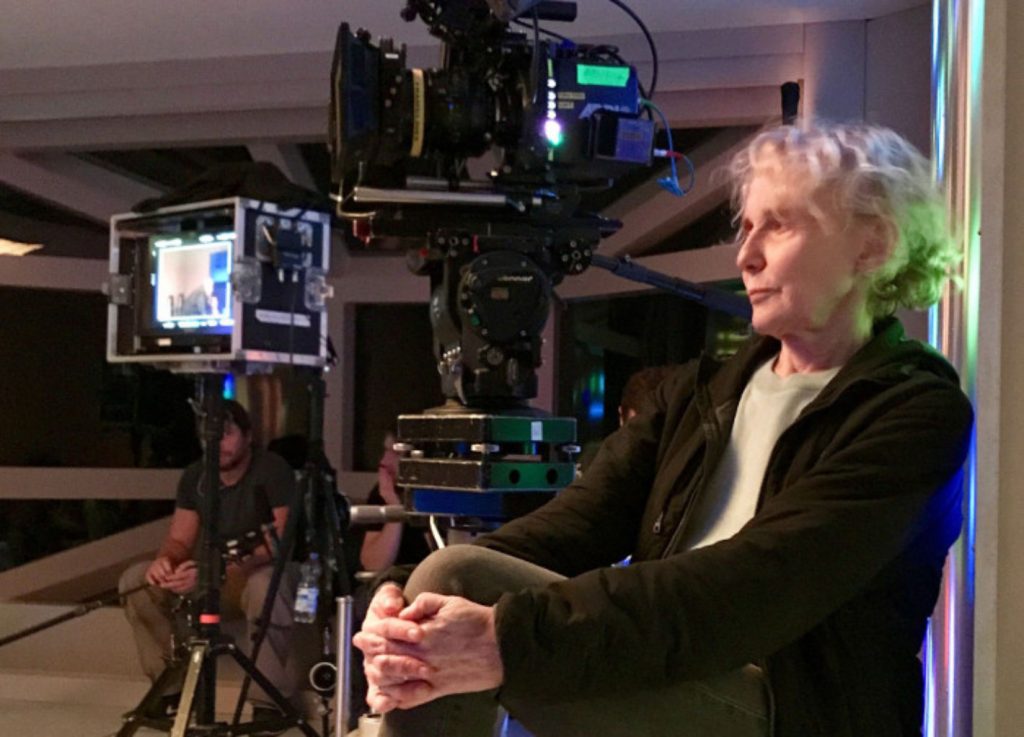
She is an outspoken, brutally honest, and fearless woman. Her shooting techniques are as unique as her personality. She shoots less and edits more. She spends most of her time in the editing room, creating the film there. Often her films evaporate claustrophobic mise en scène but still allow the gaps in elucidation. Viewers have ample freedom to, subjectively, draw the meaning from the recipe of images and sounds.
High Life featured in our list of Top 10 films of 2018
Denis is a highly collaborative filmmaker. She often repeats her cast and crew, most notably actor Alex Descas has worked with her 11 times! And except for her latest film, High Life (2018), she has exclusively worked with the legendary (female) cinematographer, Agnès Godard, in all her films.
Claire Denis is undoubtedly one of the greatest filmmakers working today.
Where to Start – Beau Travail (1999), regarded as one of the best films of the 90s.
Acclaimed Work – Chocolat (1988), J’ai Pas Sommeil (1994), White Material (2009) and High Life (2018)
18. ILDIKO ENYEDI (Hungary) (b.1955)
Ildikó Enyedi has a very interesting trajectory as a filmmaker. After initially testing waters of the art world, she chose films because of the complexity of the process. Her career is rather broken and damaged because she only made films when she needed to share something. And that’s why the construction of her film career did not happen.

In her sporadic ellipses, Ildikó didn’t have a feature film released in 18 years, just because she “didn’t have anything to say to the world”. But her comeback film caused people to faint and screenings to be halted in almost every country it released because the raw, twisted depiction of a slaughterhouse was too real for comfort. And oh, by the way, it was a love story! The film was, On Body & Soul (2017). It also gave her an Oscar nomination for the Best Foreign Language Film, and a Golden Bear win at the Berlin International Film Festival.
Ildikó’s peripatetic career, switches between features, documentaries, short films, and teaching. Her adaptive and composite films are tender, sincere, courageous, often about chances in life, and what the world has to offer. She never really shifts focus on filmmaking itself and often tries to hide behind her characters for a direct connection with the audience.
Where to Start – On Body & Soul (2017), her most recognized work
Acclaimed Work – My 20th Century (1989), Magic Hunter (1994), and The Story of My Wife (2020)
Related to Female Filmmakers Of All Time – On Body and Soul [2017] Review: The Dream and The Dreary
17. JANE CAMPION (New Zealand) (b.1954)
There’s a controlled eccentricity and wildness in Jane Campion’s work. Her films are often filtered through a character’s subjectivity. She generally shoulders on familiar components to create a startlingly fresh engagement. Her films are known for character psychology, and faithful reality of experience.
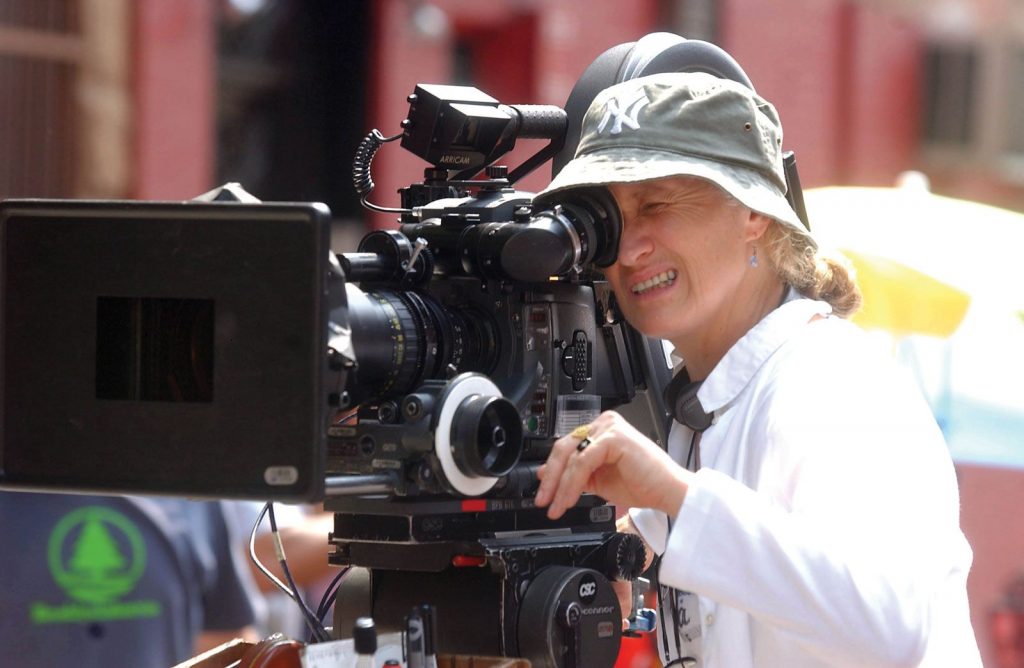
Campion, commenced her career with visual art, primarily painting. But the discontent of its limitation, lead her to filmmaking. She made several, international award-winning short films for 9 years before debuting with Sweetie, in 1989. And her magnificent break out film came in 1993, The Piano, for which, she became the second of five women ever nominated for the Academy Award for Best Director and the first and only female filmmaker (as of 2020), to receive the Palme d’Or at Cannes. Post The Piano, her films are more respected than liked.
Her artistic powers allow her to play with different narrative tones and rhythms. Lately, she has shifted her focus to television because she feels Australian/New Zealand films are mere ‘broad entertainment’ now, a cash cow. She has directed the popular series, Top of the Lake, starring Elisabeth Moss.
Jane Campion has both, experience and critical revisionism on her side, though inconsistently.
Where to Start – The Piano (1993), unlike anything the world had witnessed till then
Acclaimed Work –An Angel at My Table (1990), Holy Smoke! (1999), and Bright Star(2009)
Similar to Best Female Filmmakers of All Time – The 20 Best Movies About Writers
16. MAYA DEREN (USA) (1917-1961)
Maya Deren is a peerless name on this list. She was also a dancer, choreographer, poet, film theorist, writer and photographer. Deren is the single exception on the list with no feature film to her credit. She has only made short films, but her short films disrupted the world of cinema in such a big blow that not including her on this list, would have been a shame. She nurtured American experimental and independent cinema.
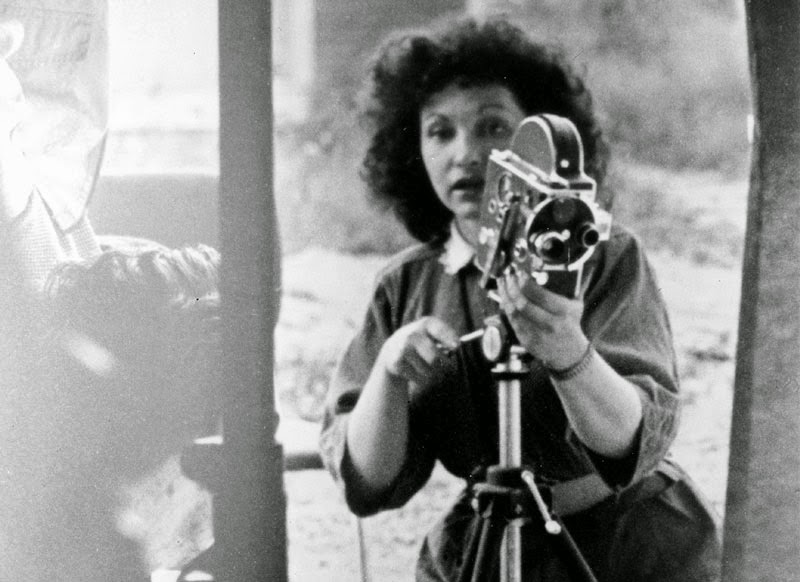
Her, perceptual black & white short films, are a study material in a majority of film schools, all around the world. But till about 1980s & 90s, her work was often cited, but rarely shown. Deren, also introduced choreocinema to the world, as to how to express one’s self through dance on camera, without dialogues or music.
She made her first and most famous film, Meshes of the Afternoon in 1943. The film is the first example of narrative work in avant-garde American film. Rumour has it that it was more of her then-husband, Alexander Hammid’s work and their marriage got into trouble when she got all the credit. But later, Hammid himself acknowledged that it was solely her creation, from conception to execution.
Maya Deren left behind a formidable legacy with her only seven completed short films.
Where to Start – Meshes of the Afternoon (1943), not because it’s her debut, but it’ll immediately give you the sense of her epiphany
Acclaimed Work – Ritual in Transfigured Time (1946), A Study in Choreography for Camera (1945), The Very Eye of Night (1958)
15. SAMIRA MAKHMALBAF (Iran) (b.1980)
Much like Sofia Coppola, Samira Makhmalbaf was born to Iranian film royalty. Her father, Mohsen Makhmalbaf, is what Francis Ford Coppola is to Hollywood. Her younger sister and stepmother are also filmmakers.
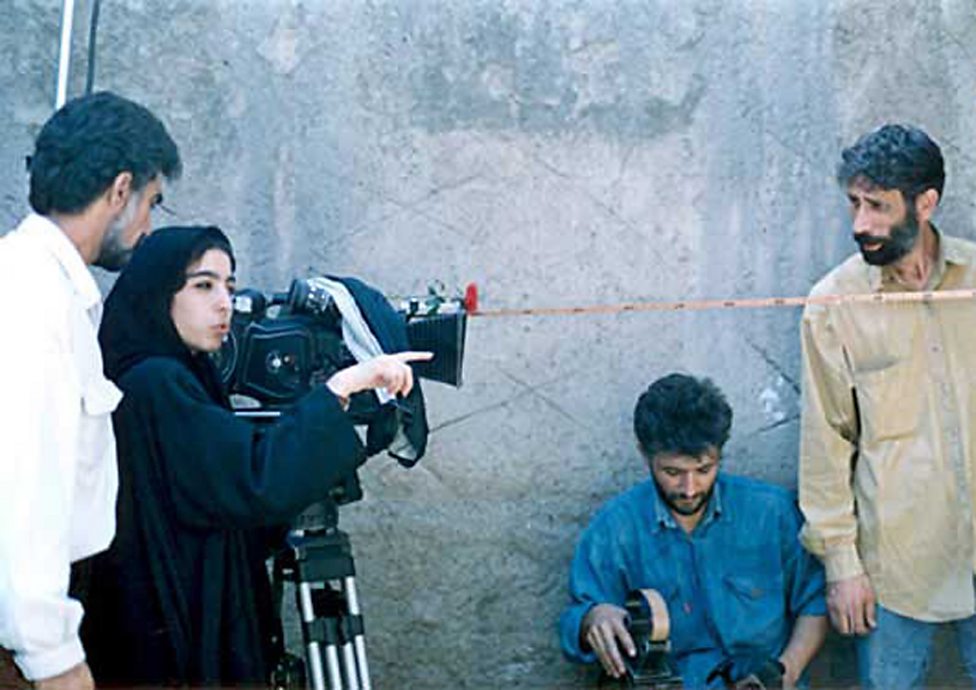
Samira’s reputation is so prodigious that one needs to keep reminding oneself that she is only 40! She debuted at the age of 17 with The Apple, 1998, and became the youngest director in the world participating in the official section of the Cannes Film Festival. Samira applies docu-fiction hybrid aesthetic to her films, à la her father. She employs non-professional actors and ground-level realism.
Her, At Five in the Afternoon (2003), was the first feature film to be shot in Afghanistan, post the Taliban environment. The film is a hardnosed statement about politics. Naturally, its production was thorny. It was shot in Afghanistan because Iran denied her permission. Targeting the crew, her shooting location was bombed, wounding six, and killing one crew member and a horse. Nonetheless, she completed and released the film to universal acclaim.
Her father was politically persecuted & left Iran. Samira and her stepmother are also in exile. After her last film in 2008, she hasn’t had a single release; there is no online activity, just nothing. Nobody knows the exact reason for Samira Makhmalbaf’s silence, but her imperative cinematic voice cannot be muffled.
Where to Start – Blackboards (2000), the film has been to 33 film festivals, across the globe & won 6 international awards
Acclaimed Work – The Apple (1998), At Five in the Afternoon (2003), and Two-Legged Horse (2008)
14. FATMA BEGUM (India) (1892-1983)
Over the years, India has produced some of the paramount directors of the world, who happened to be females. Sai Paranjpye, Aparna Sen, Zoya Akhtar, Meghna Gulzar, Anjali Menon and Vijaya Mehta to name a few. But, the one who tested the sea, and assured these girls that the water is alright, was Fatma Begum. She is India’s first female director.
Fatma Begum was a superstar actress, screenwriter, film producer, and the first woman to have her own production company in India. She launched, “Fatima Films” (later renamed as Victoria-Fatma Films) in 1926. Bulbul-e-Paristan, written & directed by her in 1926, was also India’s introduction to the new genre of ‘fantasy films’, where she used trick photography to create special effects.
Mind you, she was pioneering and paving the path during the 1920s, when women in films, in any capacity, were considered immoral in India, and male domination in every sphere was ubiquitous. Fatma is the verbatim illustration of a trailblazer. I’ve included her in this list more for her valour than her work (which was equally revolutionary by the way).
Fatma Begum passed away at age 91 in 1983, and no one was aware of the legion of glass ceilings she had broken through in the 1920s.
Where to Start – Shakuntala (1929)
Acclaimed Work –Goddess of Love (1927), Heer Ranjha (1928), Kanaktara (1929) and Goddess of Luck (1929)
13. NANCY MEYERS (USA) (b.1949)
Nancy Meyers is the most commercially successful female director in the world right now. Her six directorial ventures collectively grossed over 1 billion dollars worldwide! Her salient triumph is even more pronounced because she has, consistently & successfully, been constructing narratives about the middle to old age women, and their idiosyncrasies, something that Hollywood mostly stays away from.

Some might criticize her work for being about white-people-problems, but no one can snatch away her glorious, unswerving achievements over the years. Audiences all around the world love her films, with a neo-lit star cast and jaw-dropping, inspiring kitchen designs (her kitchen designs are a legit theme now, no kidding).
Meyers’ films are sanguine, cloaked in tranquil scenery but beneath, it’s a quest for emotional truth, that almost always, resonates. Someone who’s writing, producing, and directing movies since the 80s, she is now a wizard in traversing the predicaments in male-dominated Hollywood.
Nancy Meyers’ range might not be as wide as many other women on this list, or her cinema might not be altering the fabric of the world, but her stories are most accessible, and the magical box-office numbers are the manifestation of it.
Where to Start – The Parent Trap (1998) and/or It’s Complicated (2009)
Acclaimed Work – What Women Want (2000), Something’s Gotta Give (2003), and The Holiday (2006)
12. LUCRECIA MARTEL (Argentina) (b.1966)
Lucrecia Martel was making short films for over a decade, before emerging with her first feature film in 2001, La Ciénaga. Her aesthetic is an absurd amalgamation of a nail-biting, zombie apocalypse with the Italian neo-realistic social observations. I promise you, it’s unprecedented.

While young, she always believed filmmaking was primarily, a woman’s activity, which she soon realized, was an insane misunderstanding. Growing up, the most popular & successful Argentinean film was Camila (1984), directed & produced by two legendary women, María Luisa Bemberg and Lita Stantic respectively. They both were all over the media, promoting it. So, she thought women make films!
She has made only four feature films in the span of 16 years, with a gap of 9 years between her last two films. And the gap was not entirely intentional. Martel, was developing a sci-fi script after her 3rd film, and fallout with the producer shelved it. Depressed, she bought a boat and sailed up with two female friends and a bunch of books. One of the books was Zama, which became her 4th film. She sold that boat to fund Zama (2017).
Lucrecia Martel, is a 54-year-old openly gay woman creating her own audience, and making films on her own terms. Hacer una reverencia, señora!
Where to Start – The Headless Woman (2008)
Acclaimed Work – La Ciénaga (2001), The Holy Girl (2004), and Zama (2017)
11. SOFIA COPPOLA (USA) (b.1971)
Born to the Hollywood titan, Sofia Coppola’s awe-inspiring lineage has the potential to trammel anyone’s progress. However, she outfaced sceptics with an array of individualistic films, which are a sensuous pleasure to behold. Coppola relishes a voracious appetite for delicate atmospheres, essential spiritedness, tender female gaze and emotional liberation.
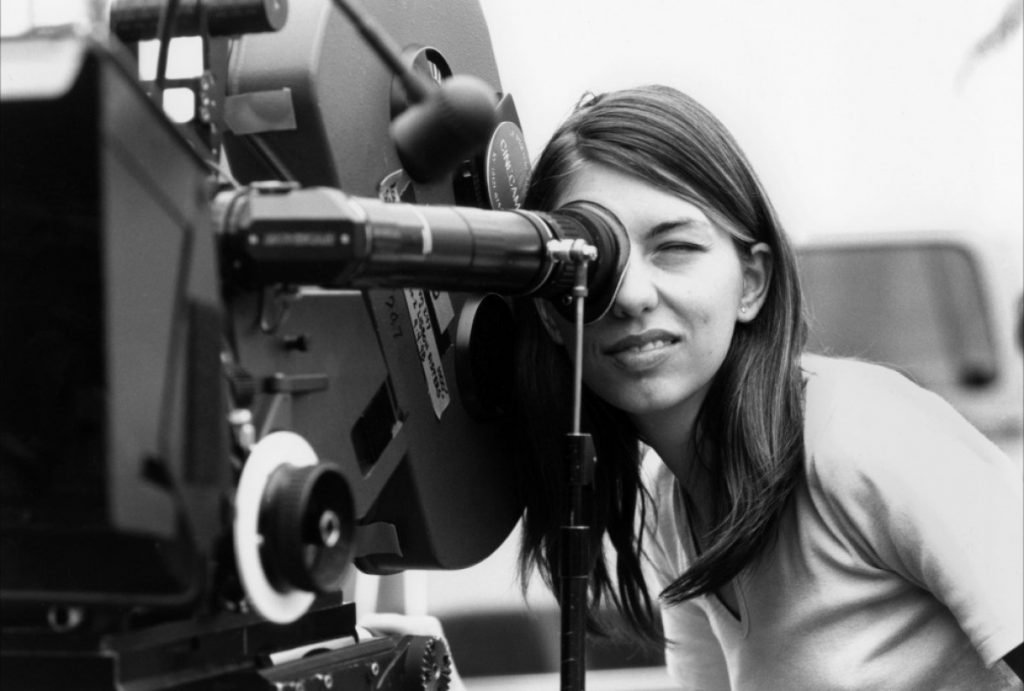
Self-admittedly, she hasn’t exactly met the usual challenges faced by other women trying to break Hollywood’s glass ceiling, owing to her ‘royal’ Hollywood pedigree. But she wasn’t left unscarred by sexist jibes. Apart from having to always fight accusations of silver-spoon privilege, her aesthetics are often dismissed as decorative, something that probably a Wes Anderson would never hear. In fact, his style is revered all across the globe.
She played a part in her father’s The Godfather 3 (1990), with overwhelmingly negative reviews. And that was the end of her acting career. Hence, she decided to direct less self-consciously reflexive cinema instead. Coppola never works on others’ screenplays and has consistently refused mammoth studio projects to make her small, personal movies.
Sofia Coppola became the third woman to be nominated for an Academy Award for Best Director in 2003. And, she became the second woman in the history of Cannes Film Festival, to win the Best Director Award.
Where to Start – Lost In Translation (2003)
Acclaimed Work –The Virgin Suicides (1999), Marie Antoinette (2006), and The Beguiled (2017)
Also, check out the ranked list of Sofia Coppola’s incredible filmography
10. ANN HUI (Hong Kong) (b.1947)
Ann Hui is the most prolific name on my list with around 30 “feature” films to her credit, in the span of over four decades. She is also the most versatile director on the list, in terms of the genres she has played with. Hui’s work has ranged from melodramas and ghost stories to martial arts movies, thrillers and adaptations of major literary works to semi-autobiographical works, female issues and social phenomena to political changes.
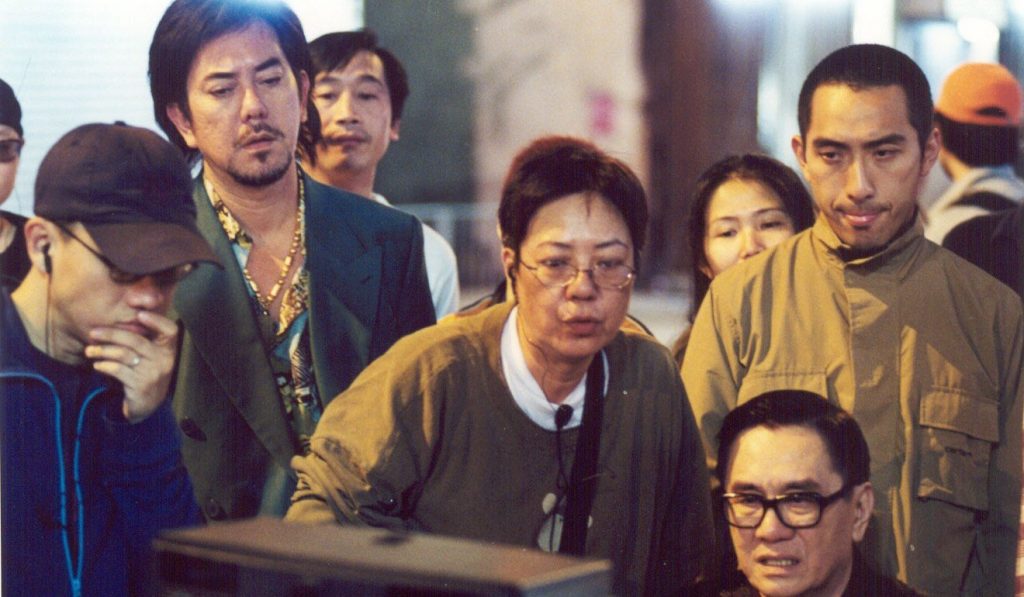
Hui is Hong Kong’s most renowned name in local and global film culture. Despite a career spanning four decades and numerous sociopolitical atmospheres, her films spread an outstandingly consistent viewpoint on contemporary life. She has been one of the first directors on the Hong Kong scene to introduce documentary material into fiction films.
She is the first female director to be honoured with the Lifetime Achievement Award at the Venice Film Festival. Ann Hui is solitarily, and I’ll say it again, absolutely singlehandedly responsible for hoisting Hong Kong’s entire film industry to an unprecedented summit. She is certainly amongst the all-time great female filmmakers.
Where to Start – Summer Snow (1995), a bitter-sweet tale of a woman’s equation with her father-in-law with Alzheimer’s disease
Acclaimed Work – Boat People (1982), Ordinary Heroes (1999), and A Simple Life (2011)
9. LARISA SHEPITKO (Russia) (1938-1979)
Larisa Shepitko is the greatest Russian filmmaker you have never heard of. In fact, if you Google “greatest filmmakers of Russia”, the topmost search will throw you almost 50 male names, including her husband’s, but you won’t find Larisa Shepitko. Reason being, she struggled much more to satisfy the dreadful official Soviet censorship during the early 1960s, than her famous male contemporaries.
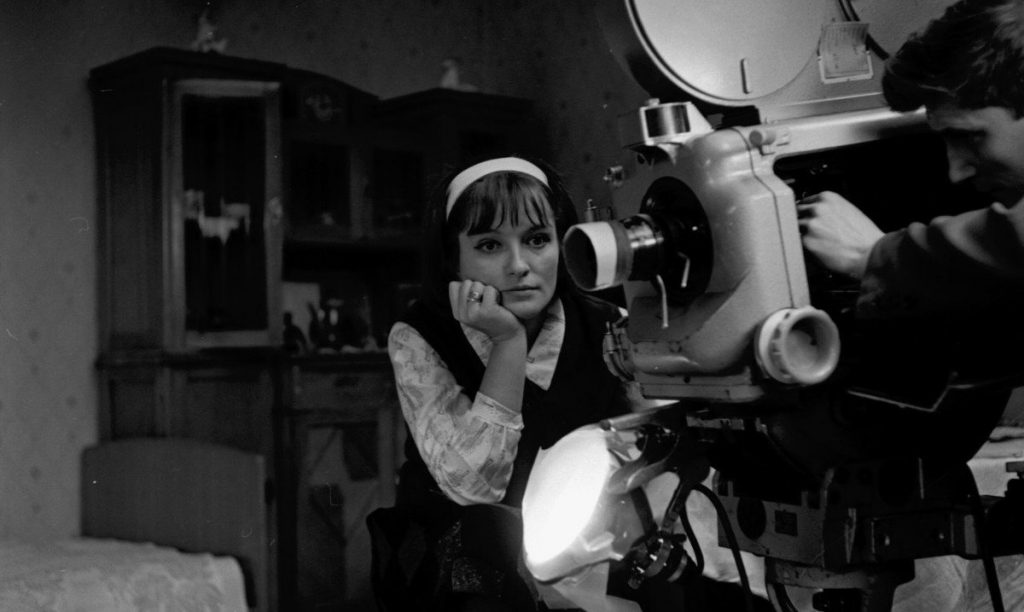
She said she makes every film as if it is her last. During her first film, Heat (1963), she contracted Hepatitis A and directed many portions of the film from a stretcher. Due to multiple onset obstacles and her relentless contest with the state’s interference in the production of You and I (1971), Shepitko, voluntarily entered a sanatorium. She suffered compound injuries there, through a horrifying fall.
With her masterpiece, The Ascent (1977), she became one of the first “method” directors of the world. She shot at real locations in minus 40 degrees, picked unknown actors whose backgrounds were close to their characters, she was wearing similar clothes as her actors on set, to suffer with them equally. If the actors were supposed to be taxed in a scene, she would be sprinting around off-camera, to feel the same. She died in a car accident in 1979, while scouting locations for her next film.
Today, only two of her films are available on DVD. The invisibility of Larisa Shepitko’s legacy is traumatic.
Where to Start – The Ascent (1977), the film won the Golden Bear at the Berlin International Film Festival
Acclaimed Work – Wings (1966), Beginnings of an Unknown Era (1967), and In the 13th Hour of the Night (1969)
8. IDA LUPINO (USA) (1918-1995)
Ida Lupino was an A-list actress of the 40s, under a contract with Warner Bros. She abhorred acting, and often fought with studio boss, Jack Warner, refusing roles she felt were below her dignity and demanded script revisions. She was suspended by the studio for most of her contract time.
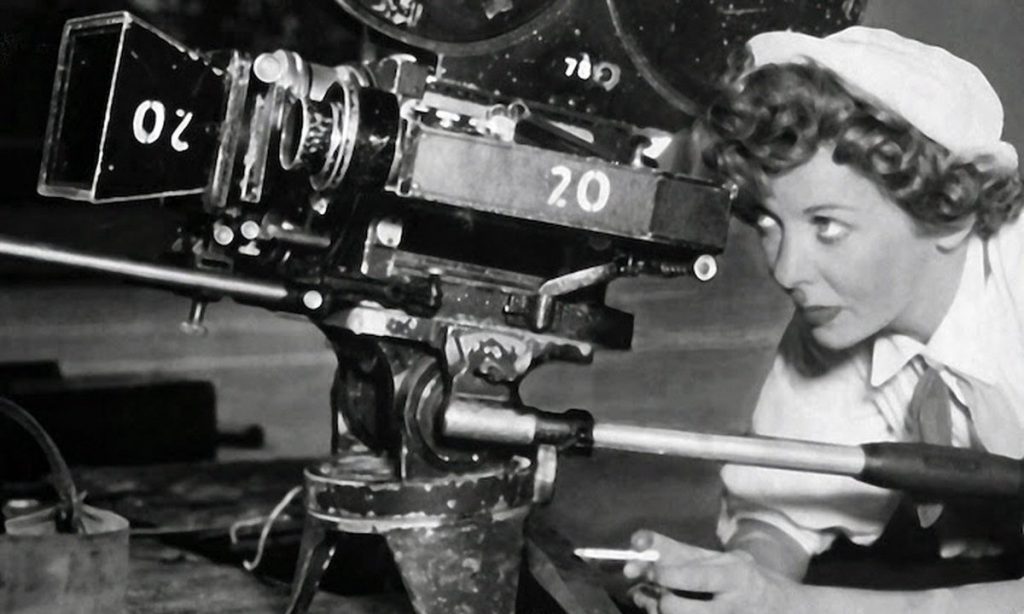
During her suspension, she spent a lot of time on sets, learning cinematography, editing, and other aspects of filmmaking. This was her film school. With The Hitch-Hiker (1955), she became the first woman to direct a film-noir. She also directed more than 100 episodes of television productions in varied genres and was the only woman to direct an episode of the original The Twilight Zone series.
Related to Female Filmmakers of All Time – Feminism and its Eternal affair with film-making
Lupino made really low-budget, socially relevant films, reusing sets from other studio productions and accommodating her friends/family in character roles. She shot in public places to avoid the costs of sets and planned scenes in pre-production to avoid retakes. And decades before the term “product placement” was coined, she was placing Coke, Cadillac, and other brands in her films. She was diagnosed with polio in 1934 but Lupino, kept acting, directing, producing, and writing many films.
Lupino consciously decided to be non-threatening in male-dominating spheres. For example, she would often pretend to know less than her cinematographer.
Ida Lupino was the second female member of the Director’s Guild. They would call a meeting and say, “Welcome gentlemen and Miss Lupino.”
Where to Start – Outrage (1950), the film is about rape and how 1950s society dealt with that. The word “rape” was not used in the film even once
Acclaimed Work – Hard, Fast & Beautiful (1951), The Bigamist (1953), and The Trouble With Angels (1966)
7. CHANTAL AKERMAN (Belgium) (1950-2015)
Chantal Akerman was and still is a leading light of experimental European cinema. Her stubborn style, resolute vision, ferocious vitality, and the sheer volume of her filmmaking (over 40 films, including shorts, documentaries, and feature), makes it difficult to situate within any definitive theoretical contexts.
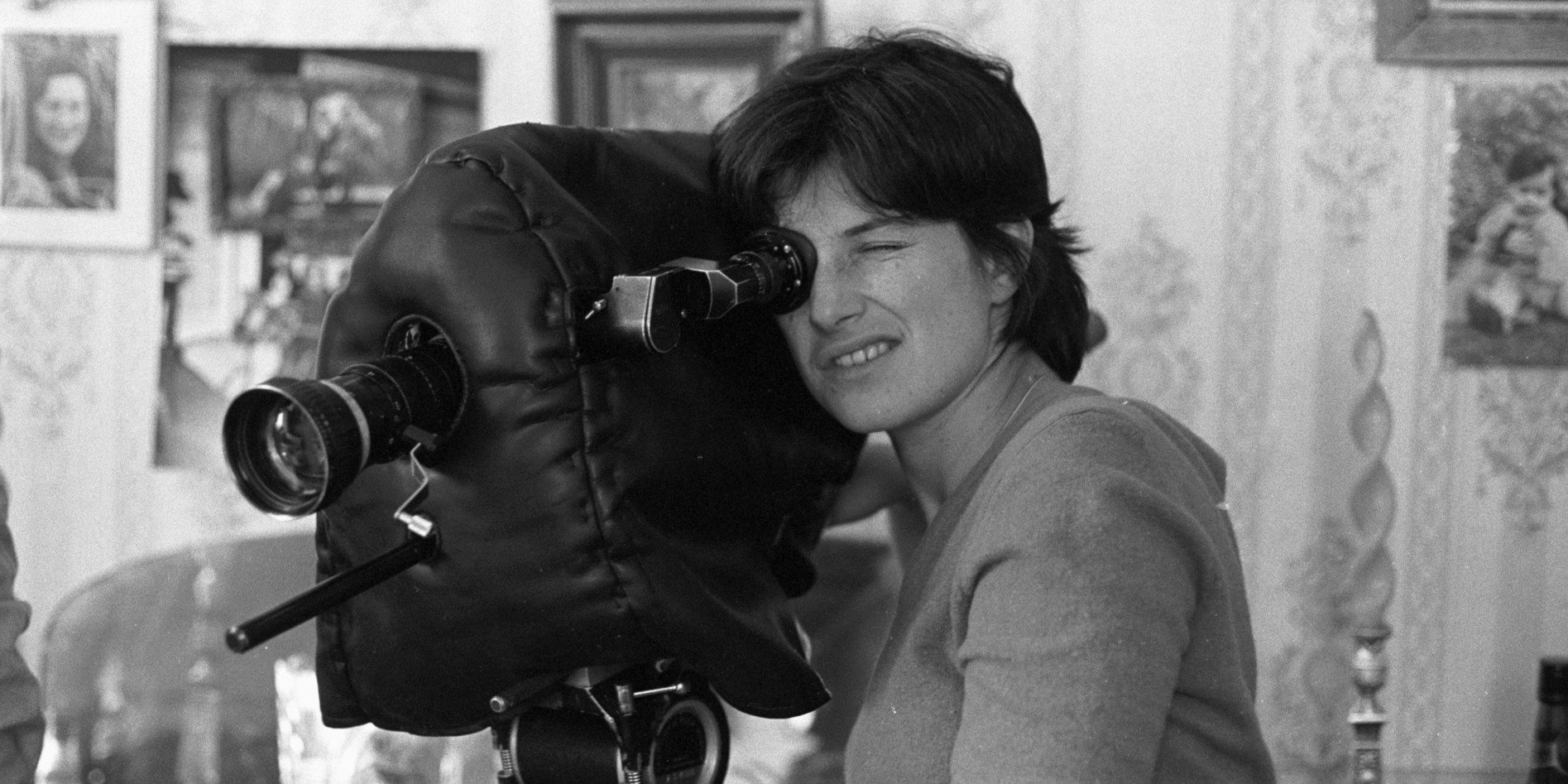
Shooting of the documentary “Grandmothers” realized by Chantal Ackerman, within the framework of the television program “Dis I”
Born to Holocaust survivor parents, she was exceptionally close to her mother, who encouraged her to have a career instead of marrying young. The residue of her relationship with her mother can easily be traced in many of her films. Her mother’s anxieties (of living through the Holocaust) were the perpetual themes in Akerman’s work.
Related to Female Filmmaker of All Time – The Career of Chantal Akerman: A Retrospective
Akerman was associated with her trademark long, frank takes, minimal dialogues, and narrative causality, which has inspired directors like Sofia Coppola and Gus Van Sant, and many others. Her most instrumental film was Jeanne Dielman, 23 Quai du Commerce, 1080 Bruxelles, released in 1975. The New York Times called it the “first masterpiece of the feminine in the history of cinema”. It is a real-time study of a middle-aged widow’s stifling routine of domestic chores and prostitution.
Died by suicide, while combating depression, and bipolar disorder, Chantal Akerman was, undoubtedly, one of the all-time great (female) filmmakers who ever lived.
Where to Start – Jeanne Dielman, 23 Quai du Commerce, 1080 Bruxelles(1975)
Acclaimed Work – Je Tu Il Elle (1974), Histoires d’Amérique (1989), and Almayer’s Folly (2011)
6. MIRA NAIR (India/USA) (b.1957)
Mira Nair belongs to a small clique of Indian filmmakers who have gained wide international validation. Her cinema is extremely attainable, yet not alienating connoisseurs. She used her ethnic distinctiveness as her calling card. Nair started her film career as a theatre actor and eventually started making documentaries. She has explored varied themes and issues long before “diversity” became an exhortation in Hollywood.
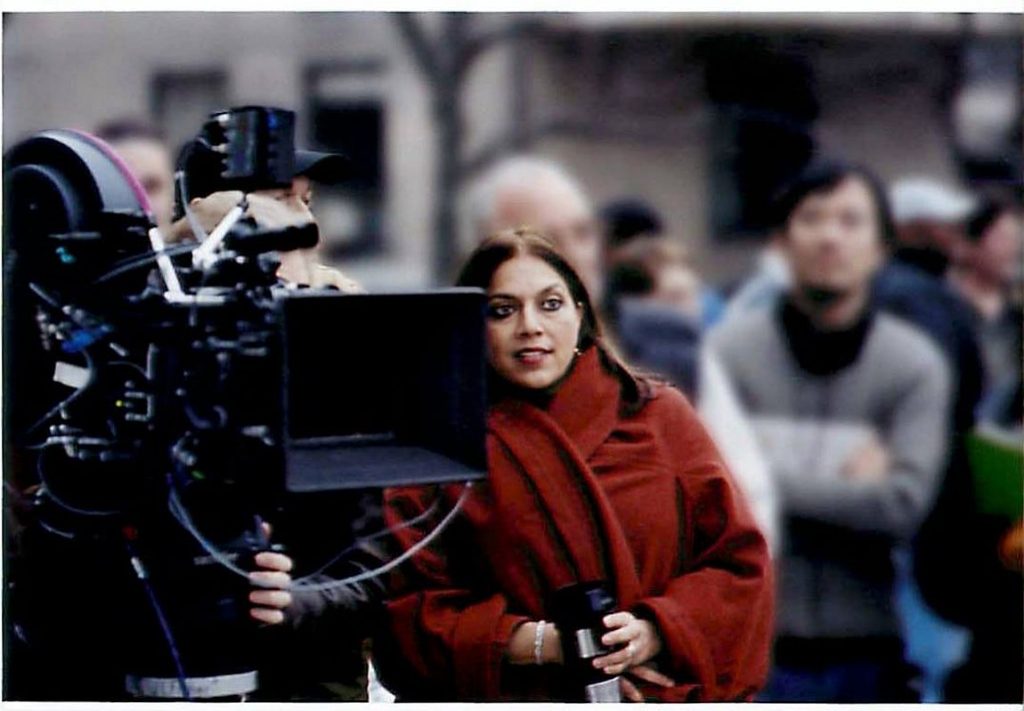
Nair has always strongly reiterated that if we don’t tell our own stories, no one else will. Hence, she refused Harry Potter and the Order of Phoenix, to direct an Indian story, The Namesake (2006). She captures the extraordinary out of ordinary life.
She constantly relies on reality, even in fiction. Her weaker and more inscrutable films also have rigorous emotional authenticity. For her most notable work, Monsoon Wedding (2001), she won the Golden Lion at the Venice Film Festival, making Nair the first female recipient of the award.
Mira Nair is consistently harnessing the truth of the moment in her work, right from her Oscar-nominated debut feature Salaam Bombay! (1988) up to A Suitable Boy (2020)
Where to Start – Salaam Bombay! (1988) and/or Monsoon Wedding (2001), either is a testament to her genius.
Acclaimed Work – Mississippi Masala (1991), Kama Sutra (1996), Vanity Fair (2004), and The Namesake (2006)
5. NAOMI KAWASE (Japan) (b.1969)
Naomi Kawase had been making short and documentary films, for almost a decade prior to her debut feature film, Suzaku (1997). Kawase’s early experimental films are fragile, transitory, and autobiographical. As a child, she was abandoned by her father, and her mother married four times thereafter. She was adopted & brought up in rural Japan by her great-aunt & uncle. She shared a combative, yet loving relationship with her great-aunt. The turbulent growing up years influenced the themes in her cinema.
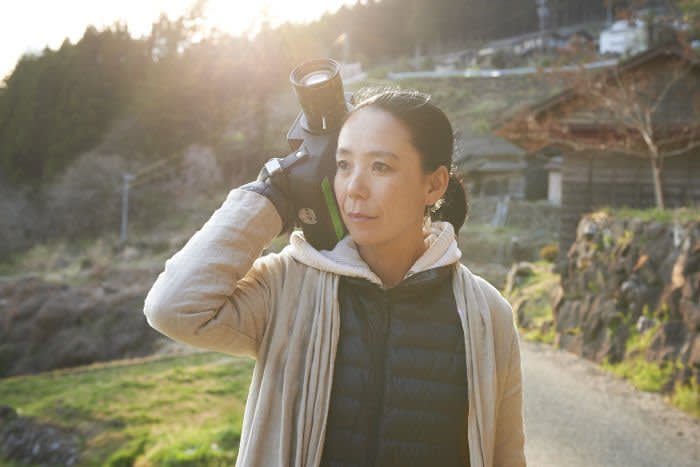
She was actually a basketball player, till about the age of 18, but as soon as she got introduced to the cinema, she knew immediately that it was her calling.
She has been a bastion at the Cannes Film Festival for over two decades. Her cinema operates on fluidity in form and sentiment. Kawase is a schismatic name in the festival circuit though. Her narrative often submerges the audience with lyrical esotericism, which either engages or enrages them. The lack of narrative clarity in her work is divisive.
Naomi Kawase is often extricating the threads between documentary and fiction. With her first film Suzaku (1997), she became the youngest person ever to win the Camera D’Or at Cannes.
Where to Start – Sweet Bean (2015), it is her most accessible film, her most mainstream sensibility so far.
Acclaimed Work – Suzaku (1997), The Mourning Forest (2007), Still The Water (2014), and True Mothers (2020)
4. LINA WERTMULLER (Italy) (b.1928)
Over the five decades of constructing dreams, Lina Wertmüller exuberantly toyed with the most monstrous and repugnant desires of the human psyche. Her cinematic creations are glitzy, salacious, humorously twisted, and often marinated with tragedy. Wertmüller reinvented sex-comedies by fusing romance, farce, and politics.
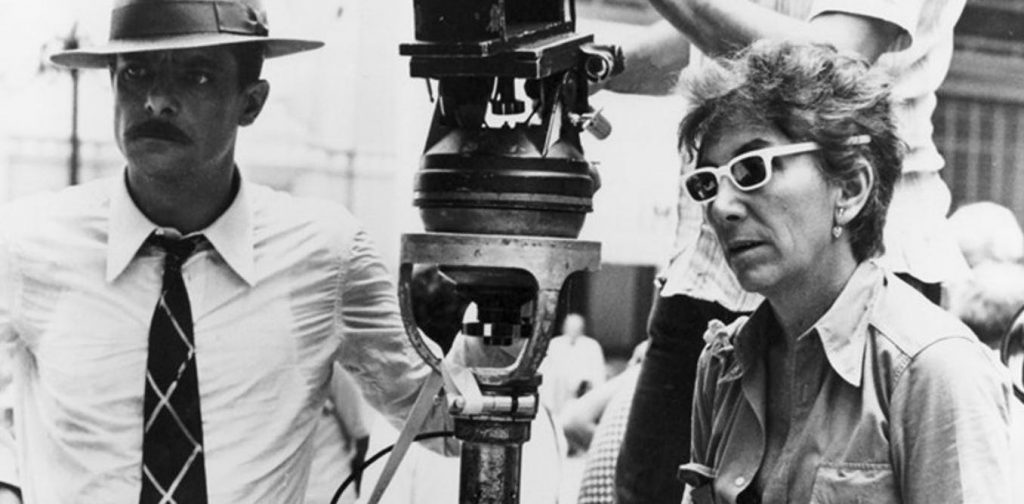
The burlesque stances, and gender politics in her films, often pushed her into the heap of a brutal assault by critics, especially feminists. She is a director whose films were inordinately venerated in some curves and acidulously vilified in others. Though she always defended herself by retorting that she is not a feminist, and she preferred to be a director, not a ‘female’ director.
She broke grounds by becoming the first woman to be nominated for an Academy Award for Best Director for Seven Beauties in 1977. Though she attended the ceremony anonymously, she’d put someone else in her place, just for fun! You could see her proxy’s face in the 5 nomination windows, during the awards.
And ironically, she was never decorated locally until she turned 80, only to be granted a series of honorary awards. She has never won the Best Director award in Italy, while the actors kept winning for her films.
Lina Wertmüller’s grotesque narrative reflects her own personality. Her body of work is a contradicting expression of her stubborn paradoxes and the dichotomy of her vision.
Her real name is – Arcangela Felice Assunta Wertmüller von Elgg Spañol von Braueich
Where to Start – Swept Away (1974), she is still most recognized with it, even at the age of 92.
Acclaimed Work – Love and Anarchy (1973), Summer Night (1986), and Ciao, Professore! (1992)
3. VERA CHYTILOVA (Czechoslovakia) (1929-2014)
Věra Chytilová’s journey is probably the most singular than the rest of the geniuses on the list. After the release and the eventual ban of her feature film Sedmikrásky (Daisies) (1966), the Czech government completely ostracized Chytilová, though never officially. This was owing to the unflinching theme of women’s liberation and strong political annotations in her cinema. And also the fact that she didn’t emigrate after the Soviet Union invasion unlike her male contemporaries, made it worse. It was virtually impossible for her to find work after 1968.
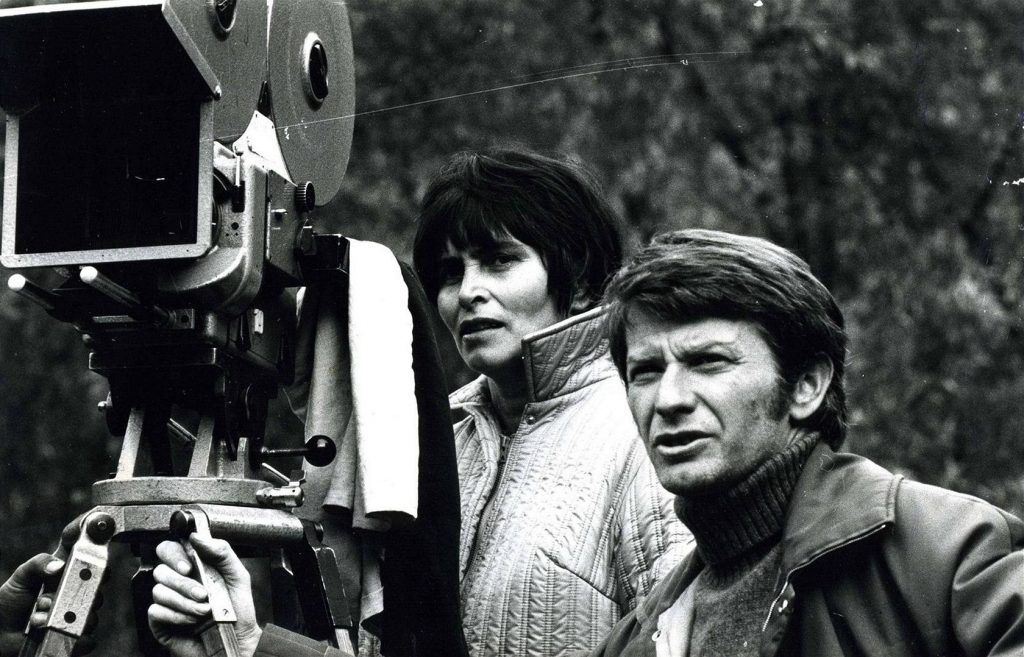
It was only after immense international pressure and her personal appeal to President Gustáv Husák, that after 7 long years, she could complete and release her next film, Hra O Jablko (The Apple Game) (1976).
Also Similar to Female Filmmakers of All Time – Vera Chytilová for beginners
She was rather infamous, for having a confrontational and intransigent attitude. At a relatively late age of 28, Chytilová studied filmmaking at a reputed academy in Prague. During the interview, she told the examining board she wanted to make films because she didn’t like the predictable films they made. And needless to say, she was selected for the course!
The compass of Věra Chytilová’s achievements over the past six decades circles far too much territory for the confines of this text.
Where to Start – Something Different (1963), a breakout film for Czech New Wave and will give you the exact glance of her uncompromising, powerful work.
Acclaimed Work – Daisies (1966), Fruit of Paradise (1970), Fuckoffguysgoodday (1992), Pleasant Moments (2006)
2. KATHRYN BIGELOW (USA) (b.1951)
Let me commence with the most known fact about Kathryn Bigelow. She is the first and, as of 2020, the only woman to win the Academy Award for the Best Director for The Hurt Locker (2008). Bigelow has constantly been in a transposing relationship with Hollywood, ever since her debut feature in 1981. Over the years, she has been successfully ascribing to the commercially viable, mainstream conventions, while determined to apply her own exclusive style, aesthetics and sensibilities. Now, she is a legit Hollywood brand as well as, critics’ darling!
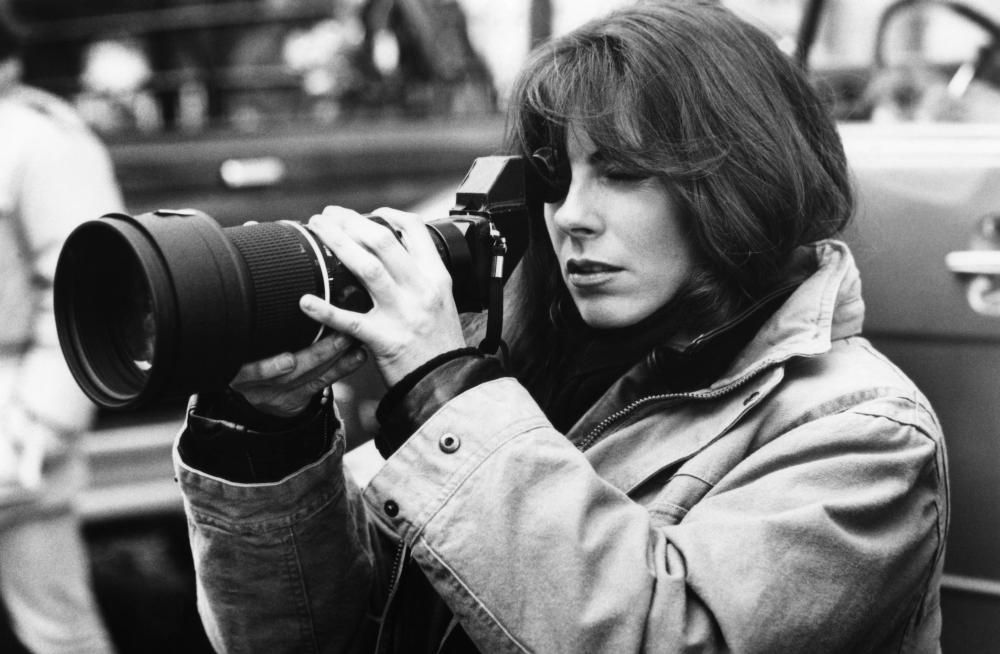
Bigelow has manipulated various genres while exploring gendered and racial politics. Often, her films are a paradox between the beauty of the frames and the terror that unfurls. She tries to turn every genre on its head and makes her audience a bit scratchy.
The Beguiled featured among the 20 best women directed films of 2017
Her movies are big and small, tender and tough, lyrical and unflinching. She is also one of the rare ‘female’ directors, who are not hell-bent on narrating women-led stories. Bigelow is simply focusing on chronicling the complexities of human despair, and our attempt to rise above. Her protagonist’s gender is incidental, not designed.
Quoting Vogue magazine here – “Kathryn Bigelow is audacious, tenacious, stubborn and powerful”. And we cannot agree more.
Where to Start – Point Break (1991), it has a cult following, and you’ll know why
Acclaimed Work – Near Dark (1987), The Hurt Locker (2008), and Zero Dark Thirty (2012)
1. AGNES VARDA (France) (1928-2019)
So, Agnès Varda is my pick for the All-Time great female filmmakers. As revolutionary as all these women on the list are, Agnès is special. Her inspiring life, unimaginably formidable films, and relentless consistency over seven decades are far beyond anyone on the list.
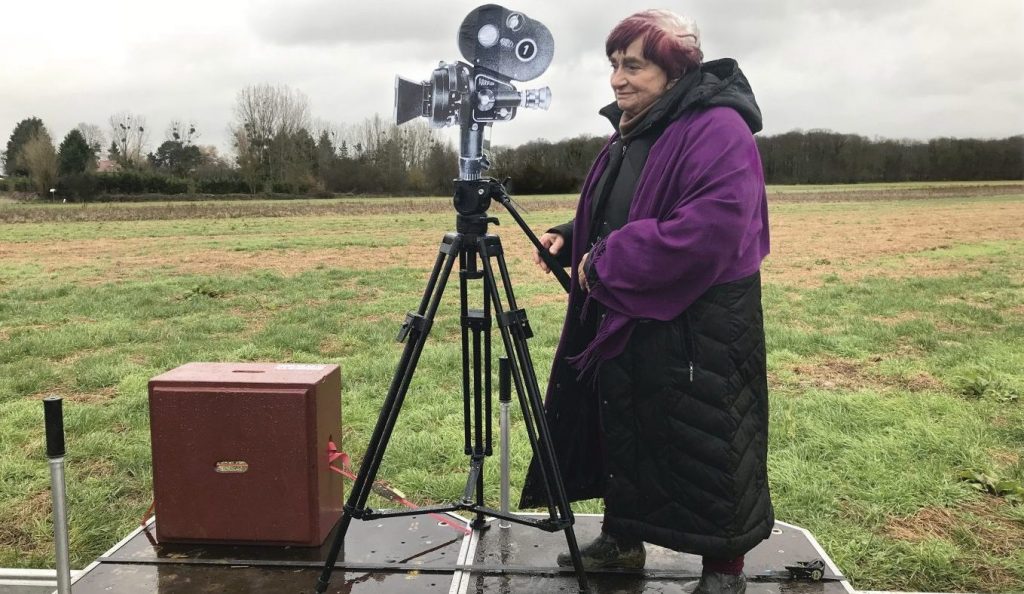
Years before the French New Wave took form in the late 1950s; she was already a member of the club and, ushered the boys in, using her exclusive membership. Her first feature, La Pointe Courte, in 1954, was the dawn of the French New Wave. François Truffaut made The 400 Blows in 1959, Jean-Luc Godard made Breathless in 1960, and expectedly, the world ceded the credit to boys. For many years, Agnès had been denied complete acceptance by the France film industry and remained eclipsed by her more popular male counterparts. But she continued to fight for radical cinema all her life.
Varda by Agnes featured in our list of the 50 Best Films of 2019
With over 40 films (including shorts & documentaries), Agnès could never relate to success. All through her career, she has made just one commercially successful film, Vagabond (1985). But the enormity of her contribution comes with the form she created, not with the viability. Suddenly, during her final years, she found herself to be more relevant and perceptible than ever. At the age of 89, she became the oldest person to be nominated for a competitive Oscar (Faces Places (2018) – Best Documentary Feature). And the same year, she was given the Academy Honorary Award. She is the first female director to be conferred an Honorary Oscar.
Her body of work is complex and exigent and leaves a rather stimulating metallic aftertaste. In fact, she coined a unique term, cinécriture, to characterize her abstract narrative style and methods.
An exemplar for women directors, and a fashion icon at 90, Agnès Varda was small in stature, with a disproportionately large presence. As she once aptly said, “I didn’t want to be a woman who makes films. I wanted to invent cinema”, and so she did.
Where to Start – Cléo from 5 to 7 (Cléo de 5 à 7) (1962), an existential film, which will force you to fall in love with her
Acclaimed Work – La Pointe Courte (1954), Vagabond (1985), Jacquot de Nantes (1991), The Gleaners and I (2000), and Faces Places (2017)


